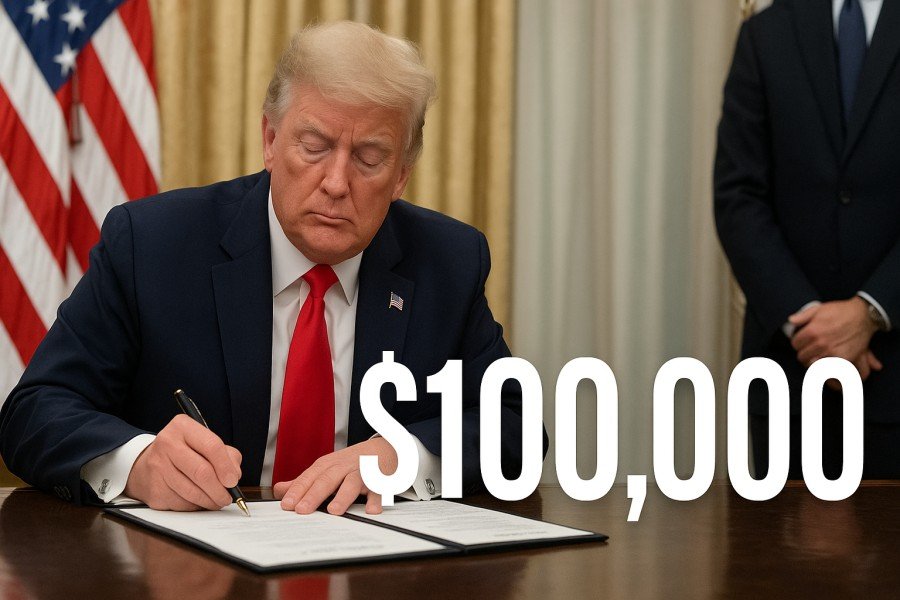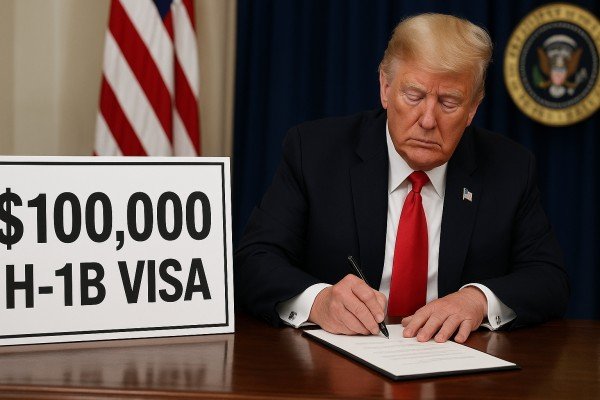The U.S. job market and immigration landscape have taken another dramatic turn as former President Donald Trump signed an executive order imposing a $100,000 annual fee on H-1B visa holders. This development has already sent shockwaves through industries that heavily rely on skilled foreign workers, including technology, healthcare, and finance. The move is seen as part of a broader strategy to limit dependency on foreign talent and encourage companies to hire more American workers.
What is the H-1B Visa and Why is it Important?
The H-1B visa is a non-immigrant visa that allows U.S. companies to employ highly skilled foreign professionals, particularly in fields like engineering, software development, research, and medicine. For decades, it has been considered the lifeline of innovation in the American economy. Many major companies, including those in Silicon Valley, have benefited from this program, citing shortages in domestic talent.
The imposition of such a hefty annual fee could drastically change how employers approach hiring foreign workers. Smaller firms may be priced out of the system, while multinational corporations might consider moving more operations abroad to offset costs.
Impact on U.S. Companies and Global Talent Flow
This executive order is likely to have a ripple effect across industries. Tech firms, which have historically sponsored the majority of H-1B visas, could face higher operating costs and slower recruitment processes. Critics argue that this will reduce the country’s competitiveness on the global stage, while supporters of the policy claim it will open more job opportunities for American citizens.
Interestingly, similar debates have unfolded in other countries dealing with globalization and labor migration. In India, for instance, economic reforms such as GST reforms have been implemented to balance domestic growth with international trade. The difference lies in how governments frame policies either to attract foreign investment or to safeguard local job markets.

Concerns Among Immigrant Communities
For immigrants and aspiring H-1B applicants, this new policy presents a significant financial burden. Beyond the cost of relocation and legal documentation, the added $100,000 fee could discourage thousands of qualified professionals from even applying. This, in turn, may weaken America’s long-standing reputation as a hub of opportunity for global talent.
Communities that rely heavily on immigrant contributions, from research labs to healthcare systems, are expected to feel the consequences first. Many advocacy groups are already questioning the constitutionality of the order and predicting legal challenges ahead.
The Political Angle
This policy aligns with Trump’s broader immigration stance during his presidency, which often focused on restricting work visas and tightening border controls. It also appears to be a strategic political move aimed at appealing to working-class voters who believe foreign workers are driving down wages.
Political experts argue that measures like this could shape the upcoming elections by drawing a clear line between pro-immigration and protectionist economic policies. While Trump emphasizes protecting American workers, critics highlight the long-term risks of isolating the U.S. economy from international expertise.
Global Repercussions
Countries like Canada and Australia, which actively welcome skilled foreign professionals, may become prime alternatives for talented workers who are discouraged by U.S. restrictions. This redirection of talent flow could create an economic advantage for those nations while putting America at a competitive disadvantage.
Furthermore, many Indian startups and professionals who once considered the U.S. their top career destination may now look inward, driving growth in their domestic market. As highlighted in our earlier blog Startups to Watch in the Indian Market, India’s entrepreneurial ecosystem is rapidly expanding and could benefit from talent staying home rather than moving abroad.
Final Thoughts
Trump’s executive order to impose a $100,000 annual H-1B visa fee is not just a policy shift; it is a potential game-changer for global labor mobility and the U.S. economy. Whether it strengthens American job security or creates unintended economic setbacks remains to be seen.
What is certain, however, is that this policy has reignited a fierce debate on how nations should balance protecting domestic workers while remaining open to global talent. Businesses, policymakers, and immigrant communities will all be watching closely to see how this plays out in the months ahead.








